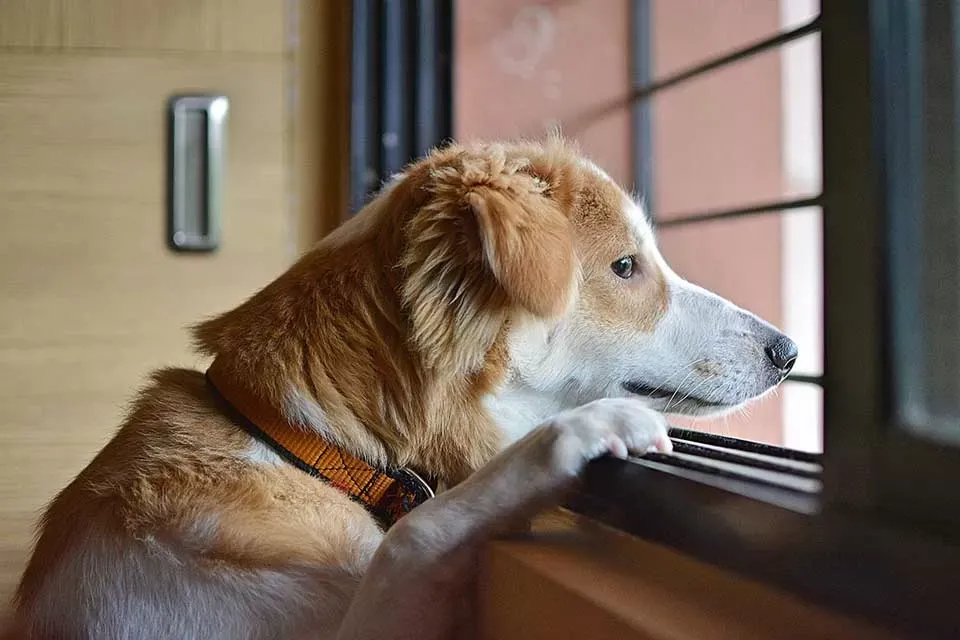Does Your Dog Have Separation Anxiety?

Does your dog bark or howl incessantly when you leave? Does he engage in destructive behaviours? Just like babies who cry when they leave their mother's arms, some dogs do not like being left alone. They get stressed and can suffer from separation anxiety. They need to learn it's okay for you to go and that inevitably you will come home!
Here's a short quiz to determine if your dog suffers from separation anxiety. Answering yes to some or all of these questions could mean that your dog suffers from Separation Anxiety.
Does your dog:
- Show signs of agitation when you are getting ready to leave?
- Constantly follow you around the house as you go from room to room?
- Persistently bark, howl, chew or whine when you leave?
- Urinate or defecate in the house only when left alone?
- Seem anxious or depressed prior to your leaving?
- Try to prevent you from leaving?
- Try to escape by digging or chewing through doors and windows?
- Pace back and forth or around and around in circles?
Causes of Separation Anxiety
Separation anxiety in dogs has several causes, one being incorrect conditioning by owners, where puppies are over-indulged, and never given the chance to become accustomed to being left alone. Over-indulging a puppy also includes allowing it into the house the moment he or she cries to be let in or immediately after you arrive home.
Other causes of separation anxiety include:
- Being abandoned by its original dog owner.
- A major change in schedule. If you used to work from home and suddenly get a new job outside of the home, this can trigger a dog's separation anxiety.
- Moving to a new home.
It's important that you rule out any medical cause for your dog's behaviour such as incontinence. Generally, we are talking about behaviours that occur only when the dog owner is away & not when you are home. If your dog barks uncontrollably or has housebreaking issues, this is a matter of dog training versus sheer separation anxiety.
Overcoming Dog Separation Anxiety
Because it can be painful to watch your dog suffering from separation anxiety, here's some tips to help him/her overcome their anxiety and be more relaxed.
- Before you leave the house, take your dog for a walk if possible. This will help to wear him out. When you get ready to leave, try not to exhibit any guilty or nervous feelings. You want your dog to know you are the leader of the pack and are calm and assertive.
- Provide your dog with his own place of safety when he is apart from you. A small room, kennel (see: Crate Training), or other quiet place will help him feel secure. Practice locking your dog away from you and out of sight in his safe place when you are home. It is important he feels relaxed in his safe place when you are home as well as when you are gone.
- When you leave the house, give your dog a favourite toy stuffed and food that will take him at least 20 to 30 minutes to finish. Your dog might like a KONG® stuffed with yummy low-fat treats. When you come home, remove this toy so he begins to associate your leaving with something enjoyable.
- If your dog suffers from more severe separation anxiety, you might need to take it in steps. Start with shorter separations and gradually increase the time over many weeks of daily sessions.
Helping your dog to overcome separation anxiety can be tricky, because the last thing you want to do is induce more fear. Our Bark Busters dog trainers are professionals in helping dog owners with strategies for dog separation anxiety training & both you and your dog will be less anxious!
Recent Articles
- Easter Holidays - Keeping our dogs safe around food
- Horticultural Horrors for Hounds
- Understanding Dog Body Language
- Heatstroke in dogs - know the signs and what to do
- Preventing Separation Anxiety When Returning To Work
- Separation Anxiety
- Managing your time at home with your dog
- Top 10 Indoor Games for your Dog
- Working from home with your dog
- COVID-19 Social Distancing and Self Isolation
